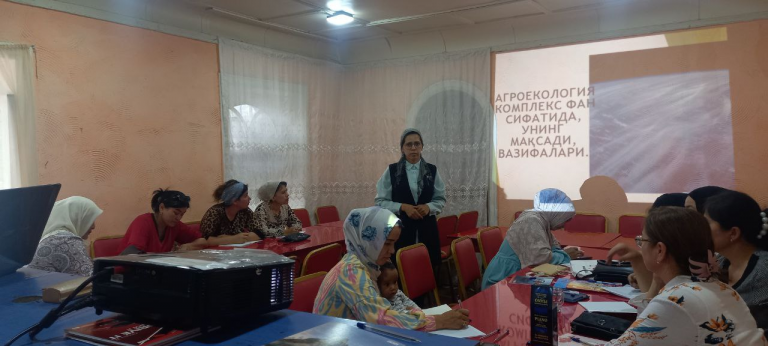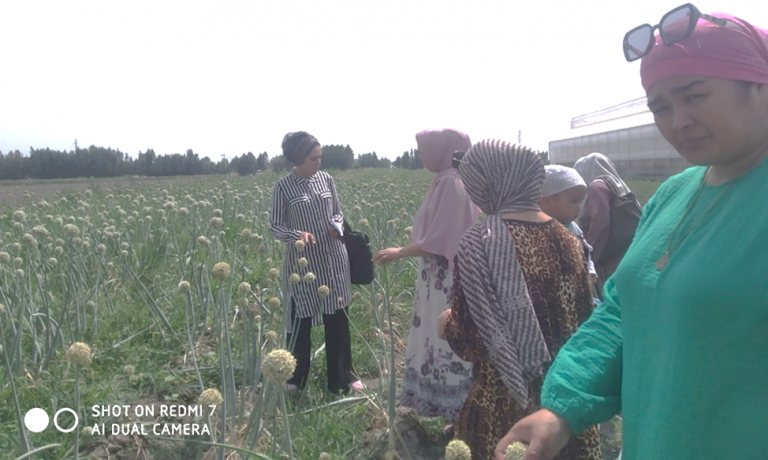Agroecology School ZHER-ANA in Akmolinsk region of Kazakhstan. February - October 2023.
Taking into account the growing problems with irrigation water, the school in 2023 focused on rational methods of irrigation, in particular, introduction the drip irrigation approach.
Location: the Republic of Kazakhstan, Akmola region, Stepnogorsk – Karabulak.
Number of participants: 30 permanent members of the agroecology school, and otherparticipants from among local farmers, peasants and urban residents with plots for gardening.
Organiser: NGO “Zher-Ana Astana” (Karabulak village, Akmola region, Republic of Kazakhstan).
The Agroecology School is based on the existing Ailana project ( vegetable growing based on agroecology principles), Olzhas farm , and farmers’ co-operative Ar-Ai (application of agroecology principles in in crop and livestock production).
Leader: Baymakova Gulmaira, head of rural NGO Zher-Ana Astana and Olzhas farm.
Agronomist (consultant): Otangaz Baidildiev
During the entire season from February to the end of September, both theoretical and practical trainings were conducted and included the following topics:
- “Efficiency of using drip irrigation in crop production.”
- “Training in the installation and use of drip irrigation depending on the type of crops and characteristics of the land plot.”
- “Green manure – reversing land degradation and increasing soil fertility.”
- “Fertilizers in organic farming: vermicompost, composts, manure. Features of application”.
- “Ecological organic protection of plants from diseases: phytosporin, biotrichoderma and others. Features of application”.
- For college students in Stepnogorsk “Agroecology and building effective systems for interaction between farmers.”
- “Introduction to seed production: the need to create your own seed funds.”
In May-June, practical sessions were held with the installation of drip irrigation systems on the plots of farmers. As part of the master classes, 20 farmers of school were given small drip irrigation kits for use on their land plots.
Watch the video on drip irrigation training in Russian
- Round table the Agroecology School during the Earth Market of SLOW FOOD in the village of Karabulak.
On 23 September in the village of Karabulak, Akmola region was held a fair of producers of natural farm products Earth Market SLOW FOOD, with the participation of members of the Agroecology School Zher-Ana – producers of vegetable and dairy products, cheese and meat products, artisan bread, beekeepers and many others. The products were grown in 2023, taking into account knowledge gained at the Agroecology School
At the end of the fair was held a round table between the participants of the Agroecology School and guests, where the practitioners shared their successes, the results of harvested crops with the application of new knowledge, as well as discussed the emerging difficulties in the use of drip irrigation systems and organic fertilisers, discussed ways of further development of the Agroecology School .
Dyikan Muras seed-savers network agroecological schools on peasant seed production in Kyrgystan. 2023.
In Kyrgyzstan, the project helped to continue and expand the work of the Dyikan Muras seed-savers network to organize agroecological schools on peasant seed production. The first schools were organized in 2020 with the initial goal of supporting women farmers who would like to learn how to produce seeds on their own, but due to tradition, workload at home (and at that time these circumstances were also aggravated by restrictions due to COVID- 19). , cannot travel far from their families and their villages to study. The training program was developed in collaboration with members of the seed bank network and agronomists and is updated every year with topics added upon request. Agroecological schools can be organized at the request of an experienced network member if there are willing farmers in their village
The main features of Dyikan Muras agroecological school on peasant seed production are:
- agroecological schools can be organized at the request of an experienced Dyikan Muras network member (who produce and submit quality seeds to Dyikan muras seed house) if there are willing farmers in their village;
- It is based on a “farmer to farmer” approach, in which a more experienced seed farmer (mentor/couch) mentors new farmers (mentee);
- training takes place in the village where both the mentor and mentee live, so they could visit each other often (no cost for travel) at more convenient time that suite to each others;
- more attention is paid to the formation of practical skills;
- the farmer-mentor monitors the results of the work of the plots/garden, gives them advice and shows them from his own experience;
- the work of the mentor is supported by an experienced agronomist scientist (usually from regional center) who visits village every month;
- Based on the results of the work, the seeds of the mentees can be accepted into the Seed House of Dyikan Muras.
In 2023 4 experienced seed growers organized 4 agroecological schools in 4 regions: Jalalabad, Chui, Issyk-Kul and Batken regions. In these schools total of 23 women-farmers completed the training. The training content includes the following topics:
- Preparing the seed for sowing
- Fertilization and planting of seedlings
- Preparation of greenhouses and sowing of seeds
- Organic fertilizers, Compost,
- Bio humus
- Irrigation: irrigation methods, irrigation times
- Soil preparation and seeding
- Pest and disease control
- Garden planting planning and rotation
- Pinching plants (excess leaves)
- Selection of fruits of annual plants for seeds, obtaining seeds
- Drying and storage of seeds
- Selection of fruits of biennial plants for seeds, preservation of mother plants
- planting mother plants and obtaining seeds of biennial plants
- Soil preparation for the year after harvest
Agroecology School for rural women in Uzbekistan. 2023


In Uzbekistan, trainings on agroecology issues were organized for the first time by Agrarian women of Uzbekistan organisation in close collaboration of local the Andijan Institute of Agriculture and Agricultural Technologies. The peculiarity of agroecological school was that it was intended to closely connect the academia sector (some of the trainers were university professors) with women-farmers. The scientists were thus able to learn more about the farmers problems and their practices.
The main goal of trainings was to introduce he basics of agroecology concept to the women farmers of the Andijan region:,the principles of sustainable crop production – soil-protective and resource-saving agriculture. The training was combined with another project (project of the US Embassy in Tashkent) on beekeeping.
The training program included visits to the Andijan Experimental Station of the Research Institute of Vegetable and Potato Growing, which is engaged in research on the creation of new varieties of vegetables and potatoes, scientific work and projects on growing seeds and crops. The women also visited aт organic farm greenhouse with an area of 2 hectares for growing tomato plants and cucumbers.
There were a total of 20 women farmers in the school.


